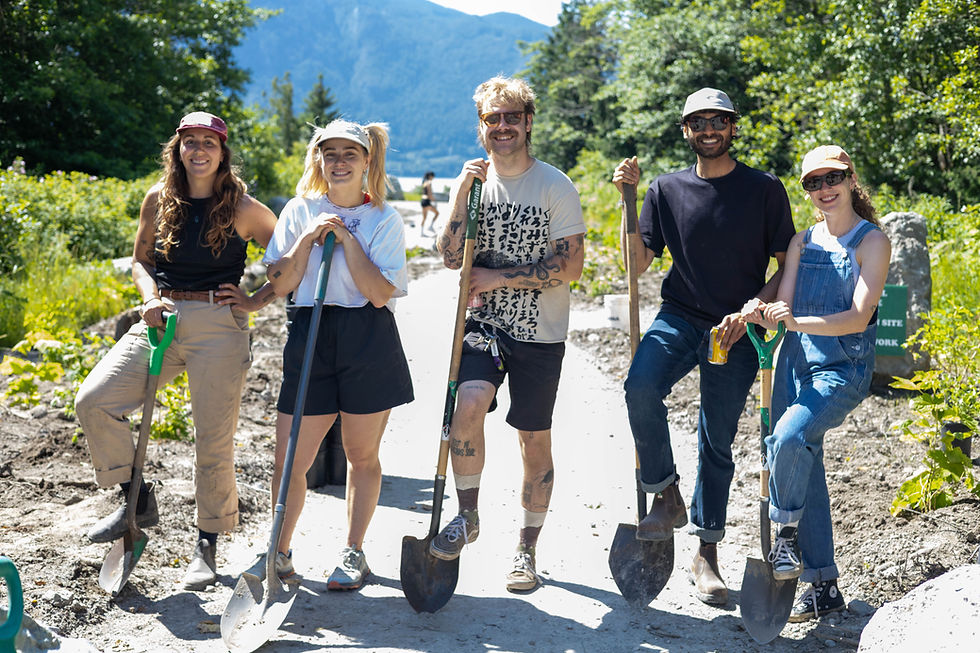Engaging with Indigenous Youth: Interior Department Awards First Indian Youth Service Corps Grants
- Youth Climate Corps BC
- Sep 13, 2023
- 3 min read
Funding to Engage Indigenous Youth in Conservation and Climate Resilience Projects

In a significant move towards fostering environmental stewardship among Indigenous youth, the Department of the Interior has unveiled the inaugural Indian Youth Service Corps (IYSC) grants. Totaling nearly $3.5 million, these grants will be distributed across eight projects involving more than 20 Tribes and Tribal organizations. The IYSC program, envisioned and established by Secretary Deb Haaland, is a partnership-based initiative aimed at offering Indigenous youth meaningful public service opportunities, focusing on the conservation and protection of natural and cultural resources.
Secretary Deb Haaland, herself hailing from New Mexico and deeply rooted in Indigenous heritage, emphasized the importance of this initiative, drawing from her own experiences. "I launched the Indian Youth Service Corps to help empower the next generation of Native leaders as they engage in the co-stewardship of public lands and the application of Indigenous Knowledge. The Corps will help these young people strengthen their connection to the lands and waters that their ancestors have cared for since time immemorial."
The IYSC program, jointly implemented by the Departments of the Interior, Agriculture, and Commerce, aligns closely with guidelines established through consultation with Indian Tribes, the Bureau of Indian Affairs, and other stakeholders.
The primary focus of the initial grant awards is to enhance Tribal capacity in conservation, natural resource management, and climate resilience. Additionally, these grants provide financial resources to Tribes and Tribal organizations, enabling them to invest in, train, and recruit a new generation of skilled Indigenous workers.
2023 Indian Youth Service Corps Grants Overview:
Wood for Life (New Mexico, Arizona, Utah, Colorado): A $1 million grant awarded to expand the Ancestral Lands Conservation Corps’ Wood for Life Program, engaging Native youth from multiple Tribes in reforestation efforts, wildland fire mitigation, and forestry, while also supporting local Tribal fuel and firewood needs.
Ahtna Cultural Heritage Youth Program (Alaska): $560,000 awarded to the Ahtna Cultural Center to promote federal-Tribal co-stewardship and expand job opportunities for Ahtna Incorporated’s Native youth.
Wabanaki Youth in Science Program (Maine): $528,119 grant to fund a corps comprised of Native youth from the Wabanaki Nations, aimed at promoting Indigenous Knowledge transfer and science education.
Traditional Farm Corps (New Mexico): $480,223 grant to support new Native youth corps in revitalizing traditional Indigenous food systems through agriculture, seed saving, and knowledge-sharing.
Hopi Youth Service Corps Program (Arizona): $300,000 grant to restore, protect, and preserve the cultural landscape on the Hopi Reservation.
7Gen Service Corps (South Dakota): $300,000 awarded to Siċaŋġu Co. to provide interdisciplinary and experiential learning internships for youth of the Rosebud Sioux Tribe.
Connecting System Impacted Native Youth to Careers in Natural Resources (New Mexico): $250,000 awarded to the Urban Native Barrio Corps to engage Native youth in restorative justice programming and technical training in environmental conservation.
Intergenerational Natural Resources Summer Youth Camp at Coronado National Forest (Arizona): $48,400 grant to benefit Native youth from Tribal communities surrounding Coronado National Forest.
These IYSC projects encompass a wide range of activities, including research projects, habitat surveys, climate mitigation, trail restoration, and educational materials development. The program promotes self-determination, economic development, and collaboration between the federal government and Indigenous communities.
The IYSC initiative not only empowers Indigenous youth but also underscores the urgent need to invest in their future as environmental stewards. As climate challenges persist, this program sets a precedent for engaging the next generation in building a sustainable and resilient future.
In these groundbreaking Indian Youth Service Corps grants, we witness not just a commitment to preserving our planet but also a commitment to empowering the Indigenous youth who hold the key to our environmental future. As we witness this inspiring endeavor in the United States, it's high time for Canada to take notice and follow suit. The success and potential impact of the IYSC serve as a beacon of hope and a testament to what can be achieved when the energy and passion of young individuals are harnessed for the greater good. With youth-led initiatives like the Youth Climate Corps (YCC) ready and eager for implementation across the country, Canada too can embark on a journey toward sustainability and resilience, led by the very generation that stands to inherit the Earth.
Learn more about Kwakwaka'wakw Revitalization Project: A Resurgence of Culture and Land Reclamation. The 2023 Indigenous youth program coordinate in partnership between Youth Climate Corps, the Kwakwaka'wakw Revilatlization Project, and Awi'nakola Foundation was a major success on North Vancouver Island!





شيخ روحاني
رقم شيخ روحاني
شيخ روحاني لجلب الحبيب
الشيخ الروحاني
الشيخ الروحاني
شيخ روحاني سعودي
رقم شيخ روحاني
شيخ روحاني مضمون
Berlinintim
Berlin Intim
جلب الحبيب
https://www.eljnoub.com/
https://hurenberlin.com/
youtube